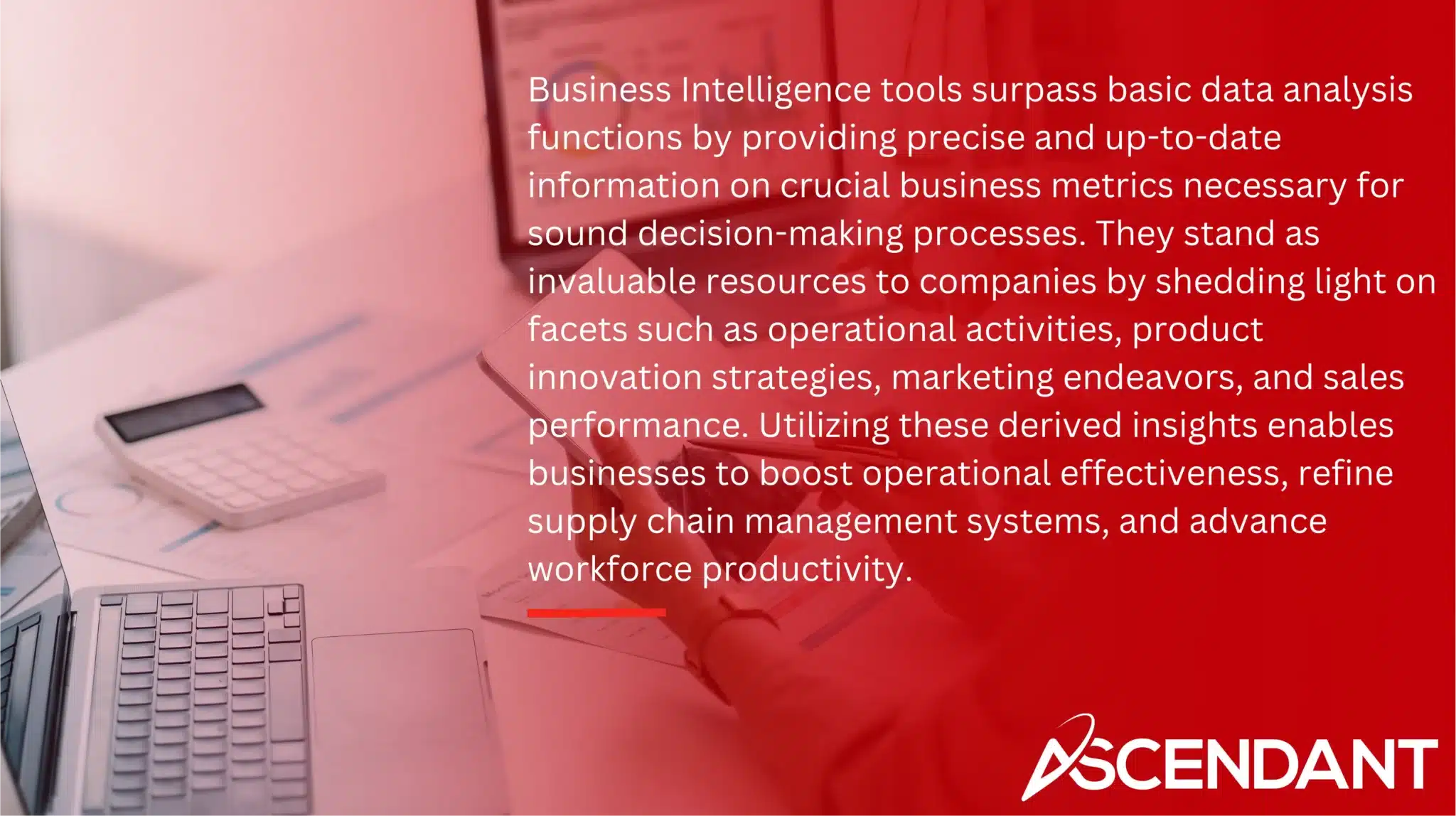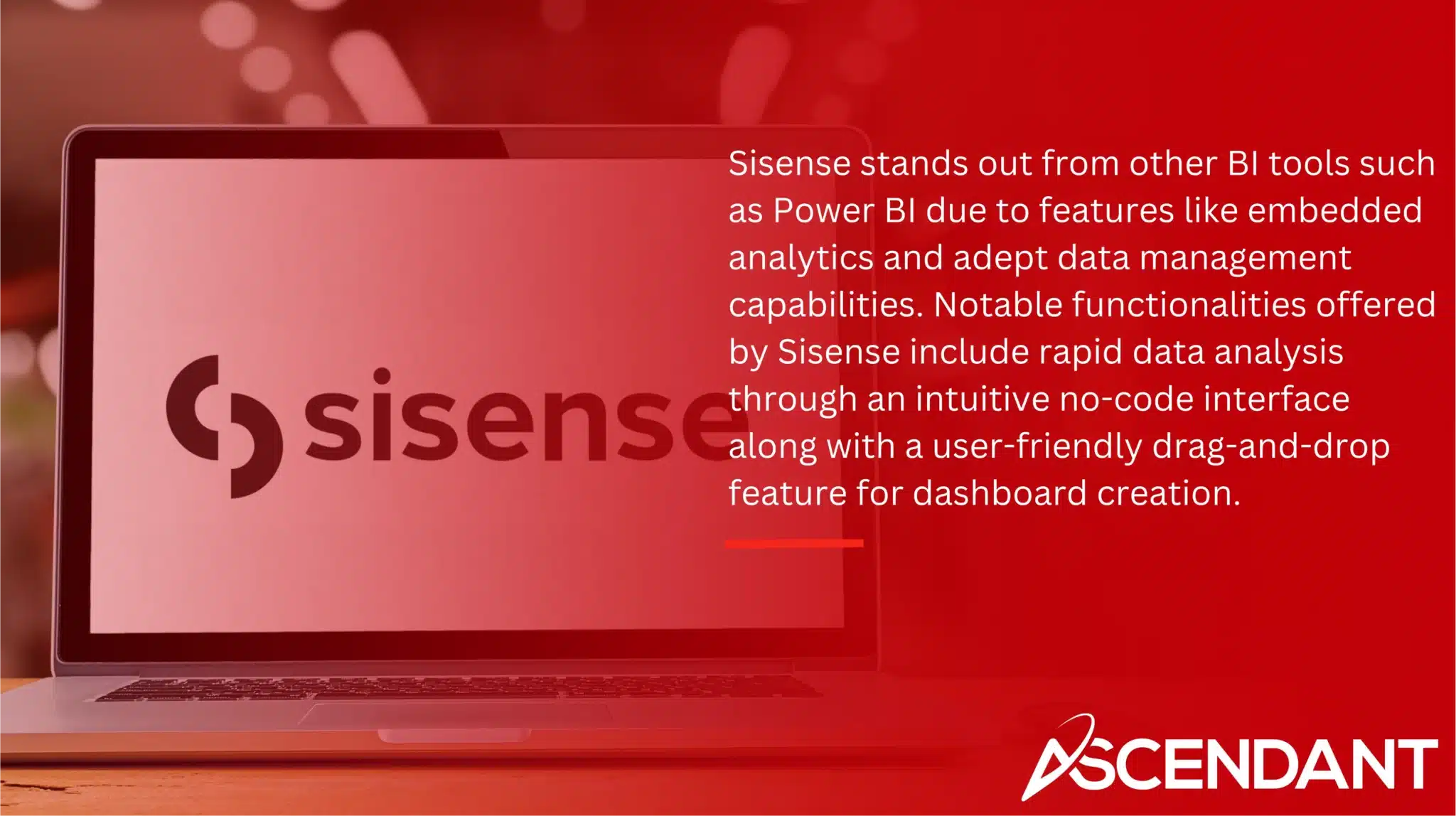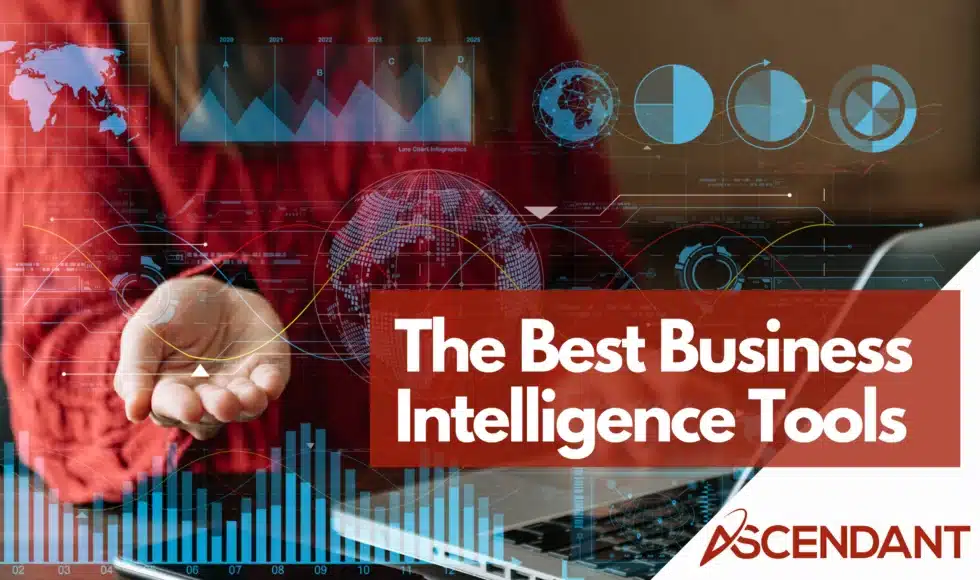Need tools to make sense of your business data? Business intelligence tools help you analyze and visualize data for better decision-making. In this article, we’ll cover the 12 best business intelligence tools to boost your data strategy.
Key Takeaways
- Business Intelligence (BI) tools are essential for organizations to collect, analyze, and visualize data, facilitating informed decision-making and improving operational efficiency.
- The BI market is expected to grow significantly, with tools like Microsoft Power BI, Tableau, and Looker Studio emerging as leading solutions for data visualization and reporting.
- When choosing a BI tool, businesses should consider factors like user-friendliness, integration capabilities, scalability, data security, and pricing to ensure alignment with their specific needs.
Understanding Business Intelligence Tools
Sophisticated software known as business intelligence (BI) tools are instrumental in gathering, processing, and presenting data from various sources for analysis. These premier BI solutions are pivotal in converting intricate data into accessible visual representations that help stakeholders pinpoint trends and patterns essential for making well-informed decisions. Imagine possessing an extraordinary lens through which the complexity of data becomes transparent, revealing vital insights with clarity. This is the remarkable utility provided by BI tools.

Business Intelligence tools surpass basic data analysis functions by providing precise and up-to-date information on crucial business metrics necessary for sound decision-making processes. They stand as invaluable resources to companies by shedding light on facets such as operational activities, product innovation strategies, marketing endeavors, and sales performance. Utilizing these derived insights enables businesses to boost operational effectiveness, refine supply chain management systems, and advance workforce productivity.
The capabilities of BI tools-are endless. They endow enterprises with the means to pursue choices rooted in concrete data analytics thus fostering enhanced efficiency alongside expansive growth potential. Independent startups or sizable conglomerates alike can find their stride through judicious employment of optimal BI toolsets tailored to streamline organizational workflows effectively.
Why Your Business Needs BI Tools
The necessity for data-driven decisions in today’s dynamic business world cannot be overstated. Organizations are leveraging the best business intelligence tools to extract valuable insights from their own data, empowering them to make well-informed choices. These intelligence tools offer immediate insights into day-to-day operations and performance metrics, thus allowing businesses swift adaptation and strategic pivots when faced with fluctuating market conditions.
BI tools enhance operational effectiveness by streamlining the processes of gathering and reporting data. By bypassing manual entry bottlenecks, access to pivotal information becomes instantaneous. The resulting efficiency not only conserves time but also bolsters overall corporate efficacy.
In an era where big data’s prevalence is escalating relentlessly, there is a correspondingly increasing reliance on advanced BI tools capable of managing intricate datasets proficiently. As projected growth for the business intelligence sector suggests it will soar to $61.86 billion by 2029 reflects its essential role in modern commerce — these Intelligence Tools play a critical role in analyzing customer tendencies and pinpointing process inefficiencies that help organizations sharpen their strategies for competitive supremacy.
BI software supports democratization within companies regarding analysis capabilities so that each member can contribute toward decision-making processes meaningfully—turning raw unstructured figures into actionable insights which equip entities with advantages over rivals within competitive markets while rigorous security measures included within those solutions protect sensitive info aligns precisely management practices directly alongside core company goals.
Microsoft Power BI
Power BI by Microsoft is a prominent business intelligence tool, acclaimed for its exceptional data visualization and instant dashboard updates. This platform empowers users to detect trends swiftly and make decisions grounded in data with the aid of predictive analytics using machine learning algorithms. Its compatibility with other Microsoft offerings enhances both its usefulness and the user experience.
The strength of Power BI lies in its adeptness at connecting to a wide array of data sources, such as Excel sheets, various databases, and cloud-based services. Such versatility allows individuals to amalgamate information from diverse platforms into complete reports. The environment provided by Power BI favors teamwork through features that permit report sharing and commentary on specific data points. It offers adaptable access options which empower users to operate efficiently from any location.
Despite Power BI’s accessibility via a user-friendly interface designed for ease-of-use, some may find navigating its complexity initially challenging. However, it becomes particularly accessible for those who are acquainted with other products within the Microsoft ecosystem because they can leverage their existing knowledge. With these comprehensive capabilities coupled with seamless integration properties, Power Bi holds a position amongst top-tiered bi tools currently available on the market.
Tableau
Tableau is celebrated for its exceptional data visualization features, providing a platform that’s intuitive and straightforward to use. It grants users the capacity to generate interactive dashboards, execute intricate computations, and carry out predictive analytics. A distinguishing attribute of Tableau is its adeptness at handling geospatial information with Spatial Parameters—this expands its utility in both investigating and visualizing data.
Geared towards accommodating organizations regardless of size, Tableau’s subscription model offers flexible accessibility and potential growth. From small-scale enterprises to vast corporations, there are various subscription plans available from Tableau that align with diverse organizational demands. The platform’s drag-and-drop interface facilitates a swift process for users to construct compelling data visualizations required for effective presentation purposes.
In essence, Tableau serves as an all-encompassing toolset aimed at bolstering the data strategy of any institution seeking advancement in this domain. With potent capabilities paired with ease-of-use considerations embedded within its design ethos, it enables individuals or teams to convert unprocessed information into actionable intelligence vital for insightful decision-making processes.
Looker Studio
Google’s Looker Studio serves as a potent tool for data visualization within the Google Data Studio environment, catering to users who desire swift and straightforward visualization capabilities. This no-cost offering allows both creators and viewers to construct personalized, interactive reports and dashboards through its user-friendly web interface equipped with an intuitive drag-and-drop editor.
The tool boasts an array of ready-to-use report templates that enable users to swiftly visualize their datasets effectively. With compatibility extending across over 600 partner data sources, Looker Studio empowers users by facilitating effortless connections between diverse datasets without any requirement for coding knowledge — making it a perfect solution for those keen on synthesizing information from varied data origins into comprehensive analytical reports.
To these features, Looker Studio promotes collaborative work culture by supporting real-time report sharing and embedding functionalities directly onto websites. Users can effortlessly transition from the complimentary version to premium versions while retaining all existing projects intact—offering scalability tailored to burgeoning organizational demands. Overall, the simplicity paired with robust capacities renders Looker Studio indispensable for entities striving towards refined data management practices.
Domo
Domo provides a cloud-based business intelligence platform that dynamically scales according to the needs of its users. The platform’s intuitive drag-and-drop interface simplifies the creation of intricate data visualizations, making it accessible for those without extensive technical skills. Domo has been designed with a mobile-first strategy, ensuring an efficient experience on touchscreen devices and thus facilitating data analysis while on the move.
Within this versatile environment, Domo allows users to develop low-code applications which can be customized to improve various business operations. This functionality enables companies to craft bespoke solutions that fit their unique requirements while circumventing the need for deep programming expertise.
With its formidable features and adaptable framework, Domo stands out as an essential resource for entities intent on harnessing data effectively in order to make well-informed strategic choices.
Zoho Analytics
Utilizing Zoho Analytics, individuals can engage in self-serviced data analysis and BI to craft dashboards and reports full of actionable insights with simplicity. It allows for the automatic synchronization of data from a range of sources at predetermined intervals, thus improving the preparation process for analyzing that information. By incorporating SSL encryption during transmission, Zoho Analytics prioritizes secure exchanges and safeguards user details while also offering integration with Google Analytics to deepen analytical perspectives.
Zoho Analytics accommodates enterprises large and small through its versatile pricing structure which includes four distinct tiers based on user count and volume of data processed. Custom plans are available for larger entities requiring specific solutions. This adaptability makes it possible for companies regardless of scale to delve into historical records and compile reports geared towards driving informed decision-making about their business operations.
Power BI by Microsoft is among the popular BI tools that integrate smoothly with Zohos’ platform alongside various other Google services, boosting both its capabilities as well as enhancing overall usage experiences. With an array of features coupled with solid security measures in place, Zoho Analytics stands out as a valuable asset for organizations intent on elevating their approach to handling data.
Sisense

Recognized by authoritative sources like Gartner, G2 and Dresner, Sisense has established itself as a premier cloud analytics solution. This commendation underscores its prominent role in the business intelligence sector. Sisense stands out from other BI tools such as Power BI due to features like embedded analytics and adept data management capabilities. Notable functionalities offered by Sisense include rapid data analysis through an intuitive no-code interface along with a user-friendly drag-and-drop feature for dashboard creation.
Leveraging Elasticube technology enables Sisense to deliver swift query responses while facilitating advanced analytics alongside intricate computations. With this technology at its core, the platform is tailored to handle voluminous datasets seamlessly without requiring elaborate configurations. Users can effortlessly design personalized widgets and dashboards courtesy of the straightforward no-code experience that it provides.
Sisense Extends its versatility by offering mobile access solutions via dedicated applications compatible with iOS and Android platforms. These options grant users the flexibility of engaging with their data analysis needs remotely — augmenting Sisense’s utility as an all-encompassing tool for business intelligence endeavors.
Qlik Sense
Data modeling, data visualizations, and machine learning capabilities are at the heart of what Qlik Sense delivers. Its advanced associative analytics engine is designed to facilitate in-depth data exploration that can reveal insights that would otherwise remain hidden. The platform leverages artificial intelligence and machine learning to augment reports and unlock more profound analytical understandings.
Qlik Sense offers businesses great versatility with deployment options both on-site and via cloud services, catering to enterprises regardless of size. It democratizes access to sophisticated data analysis by providing self-service visualization tools through a user-friendly interface, negating the need for extensive technical knowledge. It boasts an expansive API which enables comprehensive customization possibilities as well as seamless integration of its analytics features into other software solutions.
The introduction of Natural Language Insights marks another step towards enhancing interaction with the platform by integrating conversational analytic functions. All these factors contribute to why Qlik Sense stands out among choices for entities keen on utilizing their datasets effectively in strategic decision processes.
IBM Cognos Analytics
Designed to augment data analysis and reporting, IBM Cognos Analytics is a business intelligence platform that utilizes AI to offer proactive insights and suggestions in response to user inquiries. This capability serves to deepen analytical insights by revealing underlying patterns within datasets, which facilitates informed decision-making processes.
Within its self-service offerings, Cognos Analytics provides capabilities such as AI-powered organization of data, the creation of automated dashboards and reports crafted by users themselves. Upgrades made recently have refined this tool with better customization options for dashboards, enhancements in the editing experience of data modules, along with improved overall performance speed. Despite these powerful elements contained within it’s suite, it features an advanced analytics aspect requiring dedication from users who wish truly leverage all available functions effectively.
To extend its already potent range of tools, the platform includes additional functionalities like email scheduling systems alert mechanisms. Enhancing utility even more equipped with state-of-the-art characteristics paired together utilizing driven approaches towards insight generation makes robust choice for enterprises intent deepening their prowess regarding comprehensive examination big sets of information resources at their disposal.
TIBCO Spotfire
Renowned for its capacity to empower data-driven decision-making, TIBCO Spotfire offers interactive dashboards that enable the real-time analysis of complex data sets. This platform has found applications in numerous industries where organizations tap into it to harness information for informed decisions.
Boasting dynamic features and capabilities that operate in real time, TIBCO Spotfire stands out as a stellar option for companies seeking to strengthen their approach to using data. It provides comprehensive tools and interactive dashboards essential for robust data analysis, proving itself an indispensable resource within any enterprise’s toolkit.
SAP BusinessObjects
SAP BusinessObjects is a specialized software for business intelligence that excels in reporting, analyzing data, and offering interactive visualizations of information. It offers seamless integration with multiple corporate systems such as SAP ERP and Customer Experience (CX) solutions. The process to integrate includes setting up communication protocols and mapping IDs appropriately to maintain consistent data throughout.
The synergy between SAP BusinessObjects and SAP HANA enables the processing of real-time information efficiently. This connectivity allows for automatic duplication of data along with two-way exchanges across varied SAP environments. The ability of SAP BusinessObjects to work with numerous sources of data ensures it can support wide-ranging analytical operations.
While its robust capabilities are significant advantages, the intricacies involved in using SAP BusinessObjects may contribute to an increased cost implication which necessitates businesses carefully considering their operational requirements vis-à-vis economic viability when adopting this platform. Combining it with other tools like those from SAP used in planning and consolidation augments processes related to business strategy formulation and fiscal management activities, solidifying its position as a preferred option among organizations seeking advanced improvements within their approach to handling business intelligence endeavors.
Choosing the Right BI Tool for Your Business
Selecting the appropriate business intelligence tool for your company requires a clear definition of your organizational objectives and distinct requirements. An intuitive BI tool should empower all users, no matter their technical expertise, to extract insights and partake in informed decision-making. A critical feature for any BI tool is its data integration capability. Tools equipped with over a thousand ready-to-use connectors can significantly streamline data incorporation with existing systems.
When choosing a BI tool, scalability must not be overlooked. It’s important to ensure that the chosen solution can accommodate increasing amounts of data and user engagement as your enterprise grows. Equally vital is the aspect of data security — safeguarding confidential information aligns squarely with both strategic business goals and responsible data governance.
In investigating different tools’ cost structures, take into account factors such as user volume, infrastructure needs, and anticipated expansion. Testing various tools through available free trials offered by most providers lets you meticulously gauge which one integrates best within your organization before making an investment.
An exhaustive assessment of specific demands combined with practical testing will assist you in pinpointing the right business intelligence tool—one that conforms to your corporate aims while amplifying your overall strategy for managing data.
Summary
In summary, Business Intelligence tools are indispensable assets for any organization looking to thrive in today’s data-driven world. From Microsoft Power BI’s robust integration capabilities to Tableau’s advanced data visualization, each BI tool offers unique features that cater to different business needs. Looker Studio’s ease of use and Domo’s cloud-based scalability make them ideal for various business environments, while Zoho Analytics and Sisense provide powerful self-service BI and no-code interfaces.
Ultimately, the right BI tool for your business will depend on your specific goals, user requirements, and existing data systems. By carefully considering factors such as integration capabilities, scalability, and user-friendliness, you can select a BI tool that not only meets your current needs but also grows with your organization. Armed with the insights and capabilities provided by these tools, your business can make more informed decisions, drive operational efficiency, and maintain a competitive edge in the market.
 Frequently Asked Questions
Frequently Asked Questions
What are Business Intelligence (BI) tools?
Software applications known as Business Intelligence (BI) tools are designed to collect, examine, and present data from a wide array of sources. Their purpose is to enable organizations to make well-informed choices that improve operational effectiveness.
Such tools are essential in the process of converting raw data into actionable insights which can drive strategic business decisions.
Why should my business invest in BI tools?
Allocating resources to BI tools is crucial for your company because it enables the extraction of insightful data, which fosters improved decision-making processes, enhances operational productivity, and provides an advantage over competitors in the marketplace.
Adopting these instruments can revolutionize your business approaches and outcomes.
What are the key features of Microsoft Power BI?
Microsoft Power BI offers a suite of powerful features, including sophisticated data visualization tools and real-time dashboards. It also provides predictive analytics capabilities and seamless integration with additional Microsoft services.
Such functionalities greatly bolster organizations in making decisions that are guided by data.
How does Tableau support data visualization?
Tableau supports data visualization through advanced capabilities like interactive dashboards, geospatial analysis, and an intuitive drag-and-drop interface, enabling users to create compelling visual representations of their data effectively.
What should I consider when choosing a BI tool for my business?
When selecting a BI tool, focus on your business goals, user needs, integration options, scalability, data security, and cost.
Testing various tools can help ensure you find the right match for your organization.

